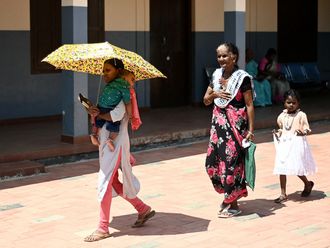Satyavati Devi, the oldest freedom fighter alive today, turned 100 last week.
At a special function, Prime Minister Manmohan Singh draped a shawl around her shoulders and released a commemorative stamp in memory of the late Krishan Kant, her son. Kant was the country's vice-president from 1997-2002, when he died.
Satyavati Devi still spins the charkha (spinning wheel) every day sitting on her bed and makes her own clothes. She used to give five sets of kurta-pyjama every year to her son on his birthday and he would wear them during the year. And on her birthday, her granddaughter and granddaughter-in-law wore the sarees that have been spun by her.
But then Satyavati , has been a woman of many parts. She was the wife and companion of Lala Achint Ram who was popularly known as the Gandhi of Punjab and who was a member of the Constituent Assembly and a Congress MP till he died in 1961. She went to jail during the Quit India movement and picketed liquor shops at the call of Gandhi. And yet she represents that generation of freedom fighters and Gandhians who find themselves on the margins today. "This is not what we fought for," she says about what she sees today.
Memories come tumbling out — of her first meeting with Gandhi when he came to Lahore, of the three days the revolutionary Chandrashekhar Azad spent in their home in Lahore, how she would quietly take food to him at meal times. On the third day he just slipped out dressed like a dhobi ( washerman).
In 1942, she and her two daughters, Nirmal, aged 5 and Subhadra, 13, were arrested. Achint Ram had already been arrested during the Quit India movement and Krishan Kant had been interned in the village. In December she asked her friend Karuna Chopra, who would visit them in jail, to get her a tricolour, which Karuna managed to smuggle in to her. On January 26, 1943, the women pushed up the flag through the chimney to have it fly atop the Lahore Jail and 20 of them started to sing a patriotic song. Some of the women were transferred to other jails as punishment and she was thrown in a room by herself. "But as it turned out, that was the only room which had a light and I was able to read the works of Gandhi and Tilak and the Bhagwad Gita and spin the charkha. So it wasn't a punishment."
During Partition, the family stayed on in Lahore as Achint Ram helped people on both sides to cross over, and came over to Delhi only in October after he became a member of the Constituent Assembly. Later he was elected to Parliament from Hissar and from Patiala. Drawn by Vinoba Bhave and the Bhoodan Movement — Satyavati walked with him to scores of villages in north India —he wanted to resign from Parliament to work full time with Vinoba. But Nehru returned his resignation letter.
On the person who inspired her most, she said: "My aunt Devki Devi. She was a widow but flouted the norms of the day and went on to study. She started to teach at the Kanya Mahavidyalaya in Jalandhar. My grandfather felt if she could be educated why should I not be sent to school." Satyavati was admitted to Kanya Mahavidyalaya. It was her schooling which fashioned her attitude towards life, country and her relationships.
At the age of 100, she still watches the news, reads the newspapers and analyses events. What were her thoughts as she turned 100? "No one thinks of the country today."












